北师大版(2019) 选择性必修第四册 Unit10 Connections Lesson1 语法精讲课件(20张PPT)
文档属性
| 名称 | 北师大版(2019) 选择性必修第四册 Unit10 Connections Lesson1 语法精讲课件(20张PPT) |  | |
| 格式 | pptx | ||
| 文件大小 | 243.8KB | ||
| 资源类型 | 教案 | ||
| 版本资源 | 北师大版(2019) | ||
| 科目 | 英语 | ||
| 更新时间 | 2023-03-17 22:04:44 | ||
图片预览


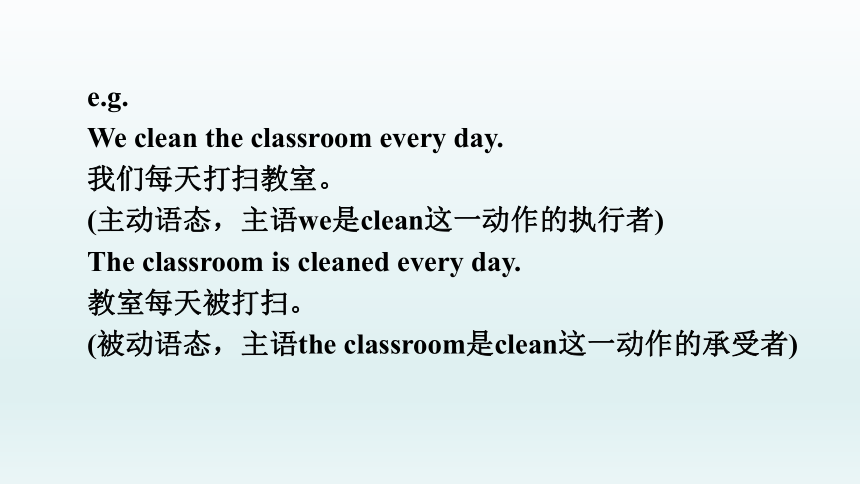
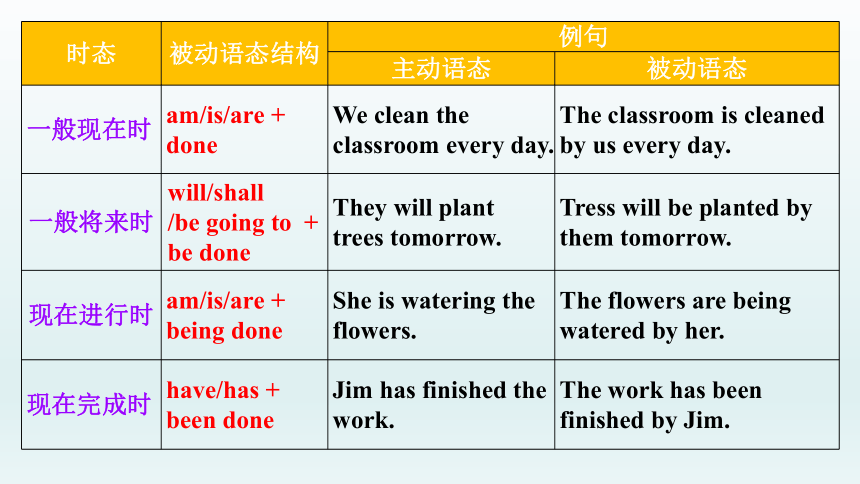
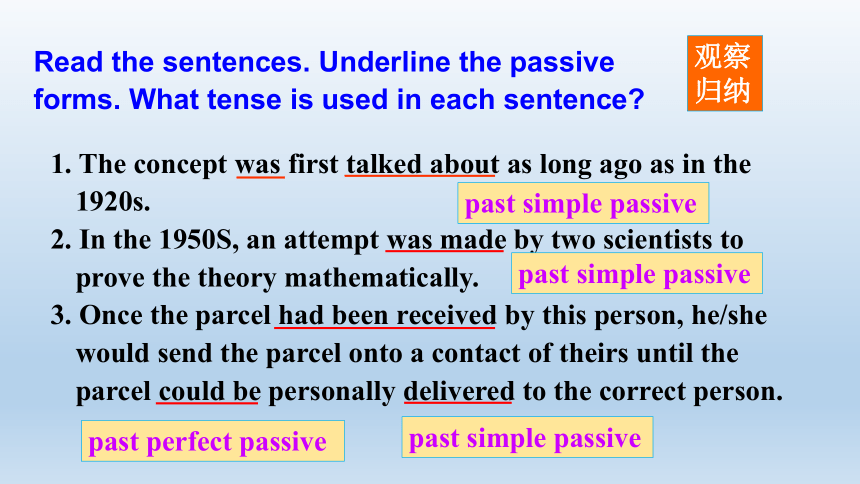
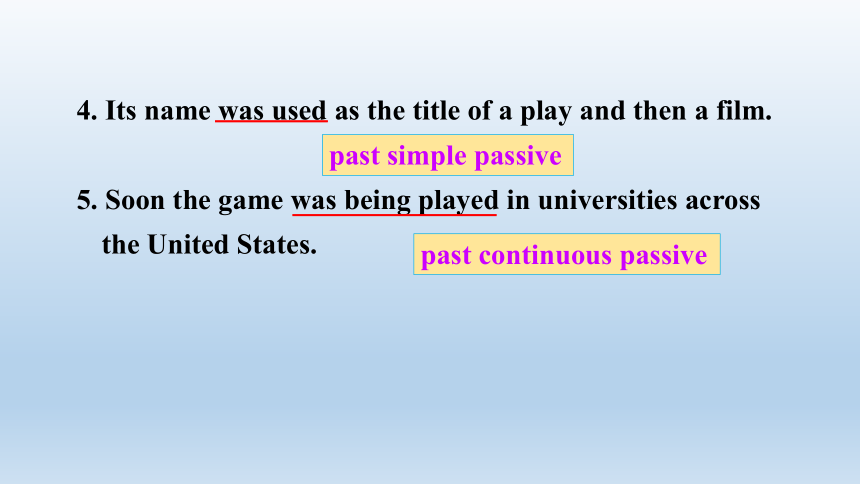
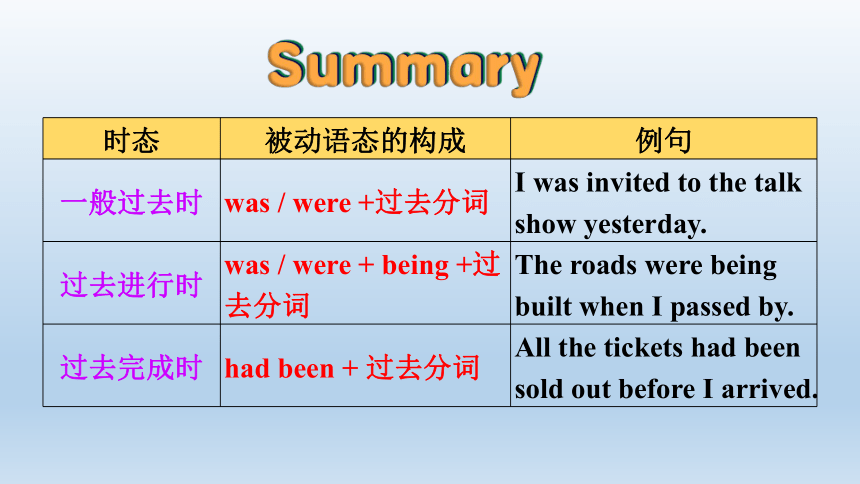


文档简介
(共20张PPT)
Unit 10 Grammar
Passive forms in the past
被动语态
英语的语态分为主动语态和被动语态。
被动语态表示主语是动作的承受者,当我们不知道动作的执行者,或没必要提及动作的执行者,或强调动作的承受者等时,常用被动语态。
e.g.
We clean the classroom every day.
我们每天打扫教室。
(主动语态,主语we是clean这一动作的执行者)
The classroom is cleaned every day.
教室每天被打扫。
(被动语态,主语the classroom是clean这一动作的承受者)
时态 被动语态结构 例句 主动语态 被动语态
一般现在时 am/is/are + done We clean the classroom every day. The classroom is cleaned by us every day.
一般将来时 will/shall /be going to + be done They will plant trees tomorrow. Tress will be planted by them tomorrow.
现在进行时 am/is/are + being done She is watering the flowers. The flowers are being watered by her.
现在完成时 have/has + been done Jim has finished the work. The work has been finished by Jim.
Read the sentences. Underline the passive forms. What tense is used in each sentence
1. The concept was first talked about as long ago as in the 1920s.
2. In the 1950S, an attempt was made by two scientists to prove the theory mathematically.
3. Once the parcel had been received by this person, he/she would send the parcel onto a contact of theirs until the parcel could be personally delivered to the correct person.
past simple passive
past simple passive
past perfect passive
past simple passive
观察归纳
4. Its name was used as the title of a play and then a film.
5. Soon the game was being played in universities across the United States.
past simple passive
past continuous passive
时态 被动语态的构成 例句
一般过去时 was / were +过去分词 I was invited to the talk show yesterday.
过去进行时 was / were + being +过去分词 The roads were being built when I passed by.
过去完成时 had been + 过去分词 All the tickets had been sold out before I arrived.
特殊结构的被动形式
1. 双宾动词的被动结构
双宾动词变为被动结构时, 一般将主动结构中的间接宾语变为被动结构中的主语, 直接宾语不变。
如将主动结构中的直接宾语变为被动结构中的主语, 间接宾语之前则应加介词to或for。
e.g. He gave her some money.
She was given some money.
Some money was given to him.
2. 带复合宾语的动词的被动结构
带复合宾语的动词变被动语态时, 一般将主动结构中的宾语变为被动结构中的主语, 而将宾语补足语保留不动(这时的宾语补足语为主语补足语)。
e.g. His father called him Jack.
He was called Jack by his father.
3. 带情态动词的被动语态,由“情态动词+be+及物动词的过去分词”构成。
e.g. The problem may be solved in a number of different ways.
In our school, library books must be returned in two weeks.
4. “be+过去分词+不定式”式的被动结构
e.g. He is reported to have broken a world record.
She is said to know three languages.
5. “It+be+过去分词+从句”式的被动结构
e.g. It’s said that she has some supernatural powers.
It’s reported that they have discovered a new star.
常见的结构还有:
It is known that... 众所周知
It is suggested that... 有人建议
It is believed that... 人们相信
6. “get + done”构成被动语态
用来表示状态或情况, 常考的形式如:
get dressed 穿好衣服
get lost 迷路
get drunk 喝醉了
get engaged 订婚
get married 结婚
get hurt/wounded 受伤
get caught/stuck/trapped 被困
主动形式表示被动意义
1. 有些不及物动词主动形式可表被动意义
1) 某些连系动词,如feel, look, prove, smell, sound, taste 等。
e.g. The food tasted better than it looked.
2) 某些与can’t, won’t 等连用的不及物动词,如move, lock, shut, open等。
e.g. It can't move.
The door won't shut.
3) 某些可与well, easily 等副词连用的不及物动词,如read, write, wash 等。
e.g. My new pen writes well.
The cloth doesn’t wash easily.
2. 非谓语动词的某些主动形式表示被动意义
1) 在“be + 形容词+ 不定式”结构中,不定式表示的动作与句子主语之间是逻辑上的动宾关系时,用主动形式表示被动意义。
常见形容词有:cheap, easy, comfortable, difficult, hard, light, heavy, expensive, pleasant, interesting, fit 等。
e.g. The question is difficult to answer.
Volleyball is very interesting to watch.
2) 在be worth doing 和be to blame 结构中,动词-ing 形式或动词不定式用主动形式表示被动意义。
e.g. The film is well worth seeing.
The policy is partly to blame for causing the worst unemployment in Europe.
3) 当want, need, require 表示“需要”时,其宾语可用动词
-ing形式的主动形式表示被动意义。
e.g. The carpet really wants cleaning (= to be cleaned).
Most house plants require watering (= to be watered).
Read the description of a "Six Degrees of Separation" experiment. Use the correct form of the verbs in brackets to complete the passage.
We l______________ (give) the task of finding out whether the "Six Degrees of Separation" theory worked at our school. We 2.________________ (tell) about the "Small-world" experiment in the United States, where packages 3________
_________ (send) from one person to another with the aim of
were given
were told
been sent
had
getting it to a stranger in the end. While the idea behind this experiment 4____________________ (discuss) in our group, it 5_________________ (suggest) to us by our teacher that we try something similar. So we did. We couldn't send parcels, but we could send letters. Ten volunteers 6________________ (choose) to take part and they 7________________ (ask) to write a letter of introduction to another person in the school that they didn't know and then to choose someone who they thought 8 _______________ (connect) to that person to give it to.
were being discussed
was suggested
were chosen
were asked
was connected
After all the letters 9_______________ (exchange) several times, seven out of the ten target people did receive their letters with chains of five or six people in each case! We think this means that our experiment was a success and it supports the theory.
were exchanged
Thank you
Unit 10 Grammar
Passive forms in the past
被动语态
英语的语态分为主动语态和被动语态。
被动语态表示主语是动作的承受者,当我们不知道动作的执行者,或没必要提及动作的执行者,或强调动作的承受者等时,常用被动语态。
e.g.
We clean the classroom every day.
我们每天打扫教室。
(主动语态,主语we是clean这一动作的执行者)
The classroom is cleaned every day.
教室每天被打扫。
(被动语态,主语the classroom是clean这一动作的承受者)
时态 被动语态结构 例句 主动语态 被动语态
一般现在时 am/is/are + done We clean the classroom every day. The classroom is cleaned by us every day.
一般将来时 will/shall /be going to + be done They will plant trees tomorrow. Tress will be planted by them tomorrow.
现在进行时 am/is/are + being done She is watering the flowers. The flowers are being watered by her.
现在完成时 have/has + been done Jim has finished the work. The work has been finished by Jim.
Read the sentences. Underline the passive forms. What tense is used in each sentence
1. The concept was first talked about as long ago as in the 1920s.
2. In the 1950S, an attempt was made by two scientists to prove the theory mathematically.
3. Once the parcel had been received by this person, he/she would send the parcel onto a contact of theirs until the parcel could be personally delivered to the correct person.
past simple passive
past simple passive
past perfect passive
past simple passive
观察归纳
4. Its name was used as the title of a play and then a film.
5. Soon the game was being played in universities across the United States.
past simple passive
past continuous passive
时态 被动语态的构成 例句
一般过去时 was / were +过去分词 I was invited to the talk show yesterday.
过去进行时 was / were + being +过去分词 The roads were being built when I passed by.
过去完成时 had been + 过去分词 All the tickets had been sold out before I arrived.
特殊结构的被动形式
1. 双宾动词的被动结构
双宾动词变为被动结构时, 一般将主动结构中的间接宾语变为被动结构中的主语, 直接宾语不变。
如将主动结构中的直接宾语变为被动结构中的主语, 间接宾语之前则应加介词to或for。
e.g. He gave her some money.
She was given some money.
Some money was given to him.
2. 带复合宾语的动词的被动结构
带复合宾语的动词变被动语态时, 一般将主动结构中的宾语变为被动结构中的主语, 而将宾语补足语保留不动(这时的宾语补足语为主语补足语)。
e.g. His father called him Jack.
He was called Jack by his father.
3. 带情态动词的被动语态,由“情态动词+be+及物动词的过去分词”构成。
e.g. The problem may be solved in a number of different ways.
In our school, library books must be returned in two weeks.
4. “be+过去分词+不定式”式的被动结构
e.g. He is reported to have broken a world record.
She is said to know three languages.
5. “It+be+过去分词+从句”式的被动结构
e.g. It’s said that she has some supernatural powers.
It’s reported that they have discovered a new star.
常见的结构还有:
It is known that... 众所周知
It is suggested that... 有人建议
It is believed that... 人们相信
6. “get + done”构成被动语态
用来表示状态或情况, 常考的形式如:
get dressed 穿好衣服
get lost 迷路
get drunk 喝醉了
get engaged 订婚
get married 结婚
get hurt/wounded 受伤
get caught/stuck/trapped 被困
主动形式表示被动意义
1. 有些不及物动词主动形式可表被动意义
1) 某些连系动词,如feel, look, prove, smell, sound, taste 等。
e.g. The food tasted better than it looked.
2) 某些与can’t, won’t 等连用的不及物动词,如move, lock, shut, open等。
e.g. It can't move.
The door won't shut.
3) 某些可与well, easily 等副词连用的不及物动词,如read, write, wash 等。
e.g. My new pen writes well.
The cloth doesn’t wash easily.
2. 非谓语动词的某些主动形式表示被动意义
1) 在“be + 形容词+ 不定式”结构中,不定式表示的动作与句子主语之间是逻辑上的动宾关系时,用主动形式表示被动意义。
常见形容词有:cheap, easy, comfortable, difficult, hard, light, heavy, expensive, pleasant, interesting, fit 等。
e.g. The question is difficult to answer.
Volleyball is very interesting to watch.
2) 在be worth doing 和be to blame 结构中,动词-ing 形式或动词不定式用主动形式表示被动意义。
e.g. The film is well worth seeing.
The policy is partly to blame for causing the worst unemployment in Europe.
3) 当want, need, require 表示“需要”时,其宾语可用动词
-ing形式的主动形式表示被动意义。
e.g. The carpet really wants cleaning (= to be cleaned).
Most house plants require watering (= to be watered).
Read the description of a "Six Degrees of Separation" experiment. Use the correct form of the verbs in brackets to complete the passage.
We l______________ (give) the task of finding out whether the "Six Degrees of Separation" theory worked at our school. We 2.________________ (tell) about the "Small-world" experiment in the United States, where packages 3________
_________ (send) from one person to another with the aim of
were given
were told
been sent
had
getting it to a stranger in the end. While the idea behind this experiment 4____________________ (discuss) in our group, it 5_________________ (suggest) to us by our teacher that we try something similar. So we did. We couldn't send parcels, but we could send letters. Ten volunteers 6________________ (choose) to take part and they 7________________ (ask) to write a letter of introduction to another person in the school that they didn't know and then to choose someone who they thought 8 _______________ (connect) to that person to give it to.
were being discussed
was suggested
were chosen
were asked
was connected
After all the letters 9_______________ (exchange) several times, seven out of the ten target people did receive their letters with chains of five or six people in each case! We think this means that our experiment was a success and it supports the theory.
were exchanged
Thank you
同课章节目录
- Unit 10 Connections
- Lesson 1 How Closely Connected Are We?
- Lesson 2 Community Spirit
- Lesson 3 Anne of Green Gables
- Unit 11 Conflict And Compromise
- Lesson 1 Living In a Community
- Lesson 2 Dealing with Conflict
- Lesson 3 War Memories
- Unit 12 Innovation
- Lesson 1 Scientific Breakthroughs
- Lesson 2 Aha Moment
- Lesson 3 Stephen Hawking
